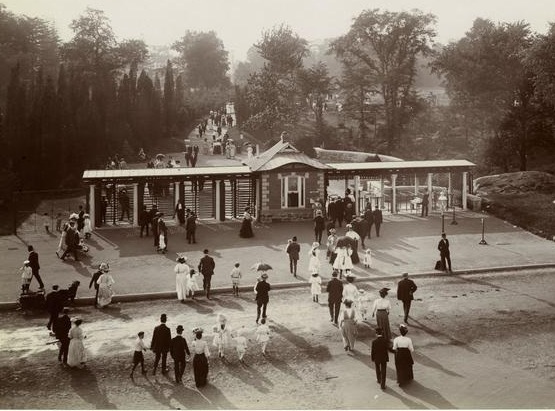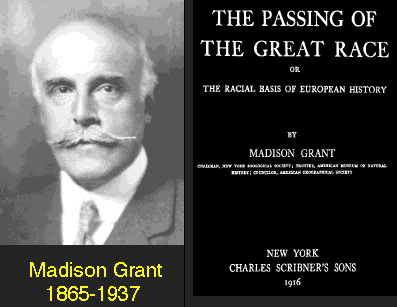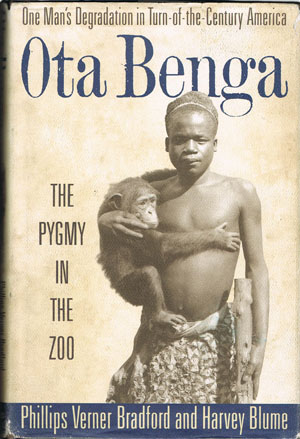
Madison Grant Racist Founder of the Bronx Zoo
John Taylor Gatto writes in his book Underground History of American Education, "The Passing Of The Great Race" :No discussion of the dreamlike years of overt American scientific racism and schooling would be complete without a nod to the ghost of Madison Grant, who has mysteriously vanished from the pages of some standard biographical references, though they still carry his cousins, Grant the portrait painter and Grant the educator.

No matter, I shall tell you about him. If you have ever been to the Bronx Zoo you have been a guest of Mr. Grant’s beneficent imagination, for he was its founder and the founder of its parent, the New York Zoological Society. The Bronx Zoo, its fame and good works inspire worldwide gratitude. Grant’s legacy to us, as free libraries were Carnegie’s.

Grant was a lifelong bachelor, a childless man. Like many people associated with public schooling on a policy level, Grant came from a patrician family which had graced society from colonial days. No Grant ever held a menial job. Madison Grant was considered a leading scientific naturalist of his time. His monographs on the Rocky Mountain goat, the moose, and the caribou are little classics of their kind, still consulted. Men and women related to Grant have been directors of American society since the Age of the Mathers.

Grant was deeply disgusted by the mixing of European races underway here; he believed the foundation of our national and cultural life lay in racial purity and backed this opinion with action. It is hardly possible to believe some of this attitude didn’t enter into the museum’s presentation of data and even into those hundreds of thousands of school field trips. In Grant’s competent hands, the boldness and sweep of old Anglo-Saxon tradition was fused into a systematic worldview, then broadcast through books and lectures to the entire planet. His magnum opus appeared in 1916 bearing the epic title The Passing of the Great Race, with an introduction by Museum of Natural History luminary Henry Fairfield Osborn—a man who wrote one of the texts I used myself as a junior high school student.

The Passing of the Great Race warns that the ruling race of the Western world is beginning to wane because of a "fatuous belief" that environment can alter heredity.7 The clear connection to the predestination canon of Calvin and to the great Norse tradition of implacable Fate is unmistakable. Grant’s own genealogy came from both these strains in European history. Whatever else he was, Grant was neither dull nor commonplace. Using Darwin and Mendelian genetics to support his argument, Grant said flatly that different races do not blend, that mixing "gives us a race reverting to the more ancient and lower type." A "cross between any of the three European races and a Jew is a Jew."

Grant argued that culture is racially determined. Alpines have always been peasants, Mediterraneans, artists and intellectuals; but "the white man par excellence" was the Nordic blonde conqueror of the North: explorers, fighters, rulers, aristocrats, organizers of the world. In early America the stock was purely Nordic, but now swarming hybrids threatened it with destruction except in a few zones of racial purity like Minnesota.

Ota Benga was a Congolese victim of King Leopold's destruction of the Congo. The Bronx Zoo displayed him as a human exhibit in the primate cage. Ota Benga committed suicide a decade later. In 1916, after he relocated to a Baptist seminary in Lynchburg, Virginia, Ota Benga shot himself in the heart with a stolen pistol.
Madison Grant felt democracy as a political system violated scientific facts of heredity the same way Christianity did, by favoring the weak. This led inexorably to biological decadence. Even national consciousness might confuse one’s rational first loyalty, which had to be race. This was the codex of the Bronx Zoo’s founder. Six years after its publication, The Passing of the Great Race was still in print and Grant’s New York Zoological Society more respectable than ever. Eventually Margaret Mead was beneficiary of considerable patronage from Grant’s Museum of Natural History, as indeed the whole shaky new community of anthropological thought became. Although Mead’s work appears to contradict Grant’s, by the time the academic world began to push the relativism of Mead, Ruth Benedict, and other interpreters of primitive culture, a double standard had settled in on intellectual life in the United States and Europe.

For those whose status was secured by birth, theories of inherited quality were available. For the great mass of others, however, the body of theory which paid off in foundation grants, the one driving modern political and economic development, was that corpus of studies exploring the notion of extreme plasticity in human nature, a pliability grading into shapelessness. If mankind were seen to be clay, radical social action justifying continuous intervention could surely bring utopia within reach, while providing expanding opportunities to academics. The academic marketplace eagerly supplied evidence that quality was innate to the powerful, and evidence that human nature was empty to the rest of us.
(source: John Taylor Gatto, Underground History of American Education, "The Passing Of The Great Race" )

http://youtu.be/R6hF3-obvnA
ReplyDeletehttp://www.guardian.co.uk/commentisfree/2012/aug/15/caribbean-olympics-athletics-genes
This man was a weak individual,uneducated idiot take his guns away and then he would have been even weaker,he feared the blackman that is why he did this he is nothing but a twat.
ReplyDeleteIt's difficult to believe the incredible influence Madison Grant wielded both as a preservationist and anthropologist in the first half of the 20th century. Not bad for a lawyer! His espousal of scientific racism and eugenics affected citizens in both the United States and Germany (where Hitler referred to "The Master Race" as a bible). His life should not be forgotten but studied as a cautionary tale.
ReplyDeleteMy favorite piece of Grant insanity is a passage in his essay on the moose. He extolled its nobility while lamenting the "Jewish characteristics" of its nose. You couldn't make Madison Grant up. No wonder his family destroyed his papers.
It is a pity that we laud and applaud people like Grant who, hiding behind his profession, was an unashamed racist. Exhibiting singularly narrow thought processes, the only comfort I can take is to realise he was simply incapable of seeing the world beyond his egoistic little world.
ReplyDeleteIs it mentioned or did I overlook that Adolf Hitler in the 1920s sent a letter of appreciation to Madison Grant, calling "The Passing of the Great Race" his "Bible"?
ReplyDeleteEventually in the future the world will respect the African way of life at that time. Africans live at peace with the world, instead of raping and polluting it as Americans/Europeans do.
ReplyDeleteEventually in the future the world will respect the African way of life at that time. Africans live at peace with the world, instead of raping and polluting it as Americans/Europeans do.
ReplyDeleteکد وبلاگ کد برای وبلاگ کد ابزار وبلاگ کد ابزار ابزار وبلاگ نویسی حرفه ای ابزار وبلاگ مذهبی ابزار وبلاگ حرفه ای ابزار حرفه ای وبلاگ کد سایت ابزار وب ابزار وب سایت ابزار وبلاگ نویسی ابزار وبسایت قالب وبلاگ کدهای زیبا سازی وبلاگ
ReplyDeletetanx for post
ReplyDeleteعکس پروفایل عکس پروفایل عکس پروفایل عکس پروفایل
عکس پروفایل عکس پروفایل عکس پروفایل
http://ow.ly/PJlj50Fy7h8